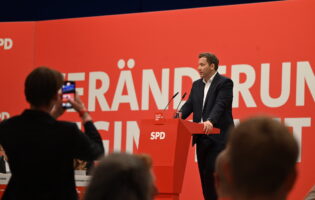
Image by Wilfried Pohnke from Pixabay
Trinitarian Politics in Germany: Impact of the State Elections in Brandenburg and Saxony

Jackson Janes
President Emeritus of AGI
Jackson Janes is the President Emeritus of the American-German Institute at the Johns Hopkins University in Washington, DC, where he has been affiliated since 1989.
Dr. Janes has been engaged in German-American affairs in numerous capacities over many years. He has studied and taught in German universities in Freiburg, Giessen and Tübingen. He was the Director of the German-American Institute in Tübingen (1977-1980) and then directed the European office of The German Marshall Fund of the United States in Bonn (1980-1985). Before joining AICGS, he served as Director of Program Development at the University Center for International Studies at the University of Pittsburgh (1986-1988). He was also Chair of the German Speaking Areas in Europe Program at the Foreign Service Institute in Washington, DC, from 1999-2000 and is Honorary President of the International Association for the Study of German Politics .
Dr. Janes is a member of the Council on Foreign Relations, the International Institute for Strategic Studies, the Atlantic Council of the United States, and American Purpose. He serves on the advisory boards of the Berlin office of the American Jewish Committee, and the Beirat der Zeitschrift für Außen- und Sicherheitspolitik (ZfAS). He serves on the Selection Committee for the Bundeskanzler Fellowships for the Alexander von Humboldt Foundation.
Dr. Janes has lectured throughout Europe and the United States and has published extensively on issues dealing with Germany, German-American relations, and transatlantic affairs. In addition to regular commentary given to European and American news radio, he has appeared on CBS, CNN, C-SPAN, PBS, CBC, and is a frequent commentator on German television. Dr. Janes is listed in Who’s Who in America and Who’s Who in Education.
In 2005, Dr. Janes was awarded the Officer’s Cross of the Order of Merit of the Federal Republic of Germany, Germany’s highest civilian award.
Education:
Ph.D., International Relations, Claremont Graduate School, Claremont, California
M.A., Divinity School, University of Chicago
B.A., Sociology, Colgate University
Expertise:
Transatlantic relations, German-American relations, domestic German politics, German-EU relations, transatlantic affairs.
__
A lesser-known story in Christian history is how the concept of the Trinity of God—Father, Son, and Holy Ghost—was the subject of massive disagreement in the early years of the Church. Getting a consensus on the “three in one” definition of God was a really difficult concept, but eventually a coalition formed around it commanded by the emperor Constantine and it became doctrine as found in the Nicene Creed. But it was a nasty controversy that took years to work out until everyone got on the same page (more or less).
Taking note of this historical chapter, we may see German politics now entering a kind of “trinitarian” era and while there are no real theological doctrines in play, it may be difficult to forge a consensus around a three-in-one coalition government.
During most of the Federal Republic’s seventy-year history, the country was governed by a two-party coalition. That has always been a brand of sorts for the stability and predictability of German policy. The system produced a total of eight chancellors since 1949, five of which were Christian Democratic leaders and three Social Democrats. During the first five decades, the coalition partner for the CDU (which forged a long-lasting joint union with the Bavarian CSU) was usually the liberal Free Democrats. However, in her four elected terms as chancellor, Angela Merkel forged three coalitions with the SPD and only one with the FDP. In turn, two of the SPD chancellors chose the FDP as well. Only once did a SPD chancellor vary that equation, when Gerhard Schröder formed a coalition with the Green Party.
That formula may be unwinding in today’s highly fragmented polarized political arena. And two recent elections at the state level in Germany are perhaps harbingers of what may become new rules in a potential “trinitarian” government in Berlin.
Two recent elections at the state level in Germany are perhaps harbingers of what may become new rules in a potential “trinitarian” government in Berlin.
The current roster of regional state coalition governments in Germany include six “trinitarian” arrangements. If Saxony joins that club, it will be the third one in which the CDU heads such a coalition. Brandenburg’s election seems to suggest that a three-way government is also emerging.
Can that ever happen at the federal level? It can—and almost did—after the elections in 2017. Following the end of her second coalition with the Social Democrats, Merkel face the prospect of a three-way government with the FDP and the Greens. The country seemed ready for it. The Greens were keen, but the FDP opted out. Merkel had to renew her deal for a third time with the SPD.
The dynamics of federal coalitions are complicated enough with just two parties negotiating a consensus when it comes to dissemination of ministries, money, and, above all, priorities. Three at the table is even more formidable and the failure in 2017 was a recent illustration.
While the laboratory for these equations have been at the state and local government level, the fact that they are viable is a reflection of a changing electorate. The CDU and SPD have had to grasp that they no longer are dominant because their voters are no longer as reliable and indeed as loyal as they once were. The SPD has seen its fortunes plunge particularly in the last few years. Some SPD leaders blame that on the decision to govern as the junior partner with Angela Merkel as chancellor. Others see the party’s message as having lost its attraction as the base of its support began to be transformed in a new economic arena.
The real change factors are that there are now seven parties represented in the Bundestag.
The real change factors are that there are now seven parties represented in the Bundestag, one of which is the Alternative for Germany (AfD), which is currently the largest opposition party. The AfD jumped into the Bundestag in 2017 with 92 members, elected primarily by eastern German voters. The AfD also just won a quarter of the votes in the elections in Brandenburg and Saxony. Many of those votes came from former CDU and SPD supporters but also from those who had not voted in prior elections.
The AfD is a regional party with its strength primarily in eastern German states. But it is represented in all sixteen state parliaments. It will remain in opposition: none of the other parties want to forge a coalition with the AfD, despite its strong showing, due to its right-wing platforms and personalities. But it will have a voice in Berlin and around the country. The question for the other parties will be how to confront the AfD with the intent of winning back supporters they lost to it.
The Greens also surprisingly managed to increase their support in the eastern states primarily due to strong support from younger and urban voters who focus on climate and environmental issues. They will likely be part of the governing coalition in Dresden and quite possibly in Brandenburg as well.
The Left Party, which championed itself as representing the eastern voters, lost ground to the AfD. It might wind up in a three-way coalition in Potsdam, but that depends on whether the Greens are more attractive.
And the FDP did not succeed in gaining enough support to be in either state parliament. They have to rethink their strategies even though they sit in the Bundestag in Berlin.
Winning elections has much to do with personal attraction of the candidates. Both minister-presidents of Saxony and Brandenburg demonstrated that skill. Now they will have to steer through three-way coalition negotiations to forge a majority government.
The next federal elections are scheduled for twenty-four months from now. Merkel is stepping down, but she plans to serve out her fourth term. Whoever is her successor as the CDU candidate in 2021 will have to reckon with the possibility of a three-way coalition. That has as much to do with a changing political climate, an electorate in transition, the dynamics of seven parties competing for support, and the ability of political candidates to connect with the voters.
Germany’s predictable political culture is getting to be a bit more unpredictable now.
Germany’s predictable political culture is getting to be a bit more unpredictable now. It is also a larger one, a more heterogeneous one, and maybe a more dynamic one. A lot more people turned out to vote in these recent elections. That is a good sign for democracy. It is also no doubt going to be harder to govern.
Three-in-one is a challenge from many perspectives. It once took an emperor to issue an order to get the job done. Today it takes persuasion and patience—but a few prayers might help, too.









